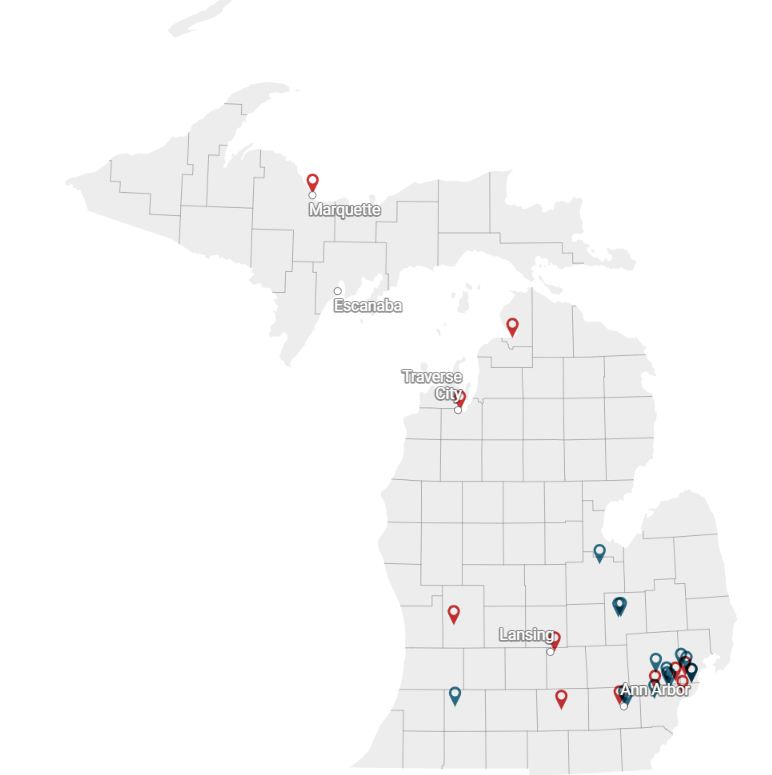Ohio Issue 1: How similar protections changed abortion in a neighboring state
By Sarah Szilagy
On October 17, 2023
COLUMBUS, Ohio (WCMH) – With Ohio three weeks away from deciding whether to enshrine the right to abortion in the state constitution, it follows in the footsteps of other states who asked voters the very same question.
Last November, voters in Michigan, California and Vermont approved constitutional measures to expand abortion access. In California and Vermont, the constitutional right came after the legislature or governor moved to protect the procedure in other ways, through statutes, executive orders and interstate agreements.
But Ohio’s neighbor to the north shares more in common with the Buckeye State, with a November 2022 vote to constitutionally protect abortion the first step it took toward ensuring access to the procedure
In Michigan, whose amendment and pre-existing abortion laws mirror Ohio’s, some of the worst fears Issue 1’s opponents have not come to pass – including the proliferation of abortions “up until birth” and the elimination of parental consent.
Michigan’s Proposition 3 passed in November 2022 with nearly 57% of the vote. Like Ohio’s Issue 1, Michigan’s abortion amendment enshrined the right to make other reproductive health decisions, including about contraception and infertility. It similarly allows for regulations on the procedure after viability.
Michigan had a near-total abortion ban on the books, dating to 1931, that prescribed criminal penalties for providers who performed the procedure. The ban was unenforceable after Roe v. Wade established the right to the procedure, and after Roe was overruled in June 2022, a judge blocked the law from going into effect after the state requested it.
The Michigan legislature then passed a bill to repeal the 1931 abortion ban, and Gov. Gretchen Whitmer signed it into law in April.
“Standing up for people’s fundamental freedoms is the right thing to do and it’s also just good economics. By getting this done, we will help attract talent and business investment, too,” Whitmer said upon signing the repeal.
Laws restricting access to the procedure in other ways, however, remain on Michigan’s books – including a parental consent requirement that lawmakers are not as ready to repeal.
Like Ohio, Michigan requires a 24-hour waiting period between when a person first sees a provider and when they can get an abortion. At their first appointment, Michiganders seeking an abortion must also submit an informed consent form verifying that they reviewed state-provided literature, including illustrations of fetal development through 28 weeks, possible risks associated with the procedure and information about prenatal care.
Michigan also has what abortion rights groups call “TRAP” laws, or targeted restrictions on abortion providers. State policies include requirements for the facilities, staffing and equipment of clinics and extensive reporting requirements.
TRAP laws have long been criticized by abortion rights groups as medically unnecessary and designed to overburden people seeking abortions and providers offering the procedure. In July, Planned Parenthood Advocates of Michigan called for the repeal of existing TRAP laws and other abortion restrictions.
“When Michiganders turned out in record numbers to vote for Prop 3 last November, this is not the future they envisioned,” Planned Parenthood Advocates of Michigan wrote in a blog post.
In September, lawmakers reintroduced a series of bills collectively called the “Reproductive Health Act” that would repeal licensing restrictions on facilities that provide abortions, eliminate the 24-hour waiting requirement and end the requirement that patients read state literature before the procedure. The bills also create a legal distinction for those who experience a miscarriage or stillbirth.
Notably absent from the slate of bills was one ending the requirement that minors get parental consent, or a judicial bypass of that consent, to obtain an abortion. Previous versions of the Reproductive Health Act eliminated the parental consent requirement.
“The goal is to do as much of this work as we possibly can, and we didn’t want to include anything that would have prohibited the rest of the package from getting through at this point in time,” a Michigan lawmaker told reporters.
Other laws restricting access to the procedure also remain untouched by the proposed act, including a ban on state and private insurance covering most abortions and a requirement that only physicians, and not other medical providers, can perform the procedure.
Abortion rates and access, pre- and post-amendment
Despite a constitutional right to the procedure, abortion is prohibited in Michigan after viability – generally around 24 weeks gestation – except for the life and health of the pregnant person.
According to Abortion Finder, a national database of verified abortion providers in the U.S., Michigan has 26 in-person abortion providers and five virtual providers that ship abortion medication to Michigan residents.
Six clinics in Michigan offer abortions after 20 weeks, with only the University of Michigan Von Voigtlander Women’s Hospital in Ann Arbor and a clinic in Eastpointe offering the procedure up to the gestational limit. Ten of the 26 clinics offer medication abortions up to 11 weeks. The remaining clinics perform the procedure through 15 to 19 weeks.
Michigan Abortion Providers

All clinics that offer abortions at 20 weeks and later are located in the southeasternmost part of the state. Only medication abortion is available in northern Michigan, including from the sole provider in the Upper Peninsula.
Despite the increased protections for patients seeking and providers performing the procedure, early data for 2023 indicate similar levels of abortions were performed compared to before the amendment.
In the five months after the abortion rights amendment passed, Michigan had an average of 2,942 monthly abortions, according to the Society of Family Planning. In the five months before the amendment passed, the state averaged 3,026 each month.
The Guttmacher Institute estimates that about 21,300 abortions were performed in Michigan in 2023 through July.
This piece was republished from NBC 4.